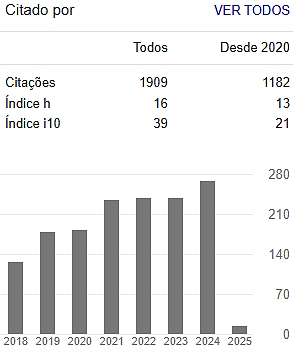Patriarchy X Feminism: The struggle for an egalitarian society in Brazil and Bolivia
Keywords:
Patriarchal society; Feminist movements; Gender issuesAbstract
This study aimed to analyze the patriarchal system that is rooted in South American societies, especially in Brazil and Bolivia, and the influence of feminism in both countries. We understand that analyzing this system in neighboring countries is necessary to understand the pattern that was established, in which the patriarch (man/father) is in a dominant position, while the woman/mother is in a subordinate position. However, feminism, which emerged as an opposition/response to the patriarchal system, needs to be understood as a movement with a political, philosophical, educational and social. This confrontation has resulted in numerous rights already conquered and the beginning of the construction of a more just and egalitarian society. Although we recognize that a long path has already been taken by this Movement in both countries analyzed, we cannot fail to recognize that a long path still needs to be taken so that women are respected in all their choices in both societies. Furthermore, we recognize that the school plays a fundamental role in building this just and egalitarian society, as it contributes to the deconstruction of knowledge ratified by patriarchy, through science and gender studies.
Downloads
References
ALLIÓN, Virginia. Debates em el feminismo boliviano: de la Convención de 1929 al “processo de cambio”. La Paz: Ciencia y Cultura., 2015.
ANDRADE, Letícia Ésther de. A consolidação do patriarcado no Brasil: a origem das desigualdades entre homens e mulheres. Revista Científica Multidisciplinar Núcleo do Conhecimento, v. 7, n. 11, p. 25-39, nov. 2021.
BOHRT, TeresaArteaga. Homens, cavalos e mulheres: abordagem analítica de livros escolares machistas. Revista de Inv. Educação, v, 6, n.2, p.115-127, 2013.
BRASIL. Constituição da República Federativa do Brasil: promulgada em 5 de outubro de 1988. Disponível em: http://www.planalto.gov.br/ccivil_03/constituicao/ constituicao.htm. Acesso em: 02 abr. 2023.
BOLÍVIA. Reforma Electoral: Ley de 19 de marzo de 1997. Disponível em: https://reformaspoliticas.org/wp-content/uploads/2015/03/bolivialeydereformaelectoral cuotasfemeninasreforma1997.pdf. Acesso em: 02 abr. 2023.
ENNES, Marcelo Alario; MARCON, Frank. Das identidades aos processos identitários: repensando conexões entre cultura e poder. Sociologias, Porto Alegre, v. 16, n. 35, p. 274-305, abr. 2014.
FELGUEIRAS, Ana Claudia M. Leal. Breve panorama histórico do movimento feminista brasileiro: das sufragistas ao ciberfeminismo. Revista Digital Simonsen, v. 4, n. 6, p. 108-121, 2017.
GONZALES, Silvia Requena. Um olhar sobre a situação da violência contra as mulheres na Bolívia. Revista de Psicologia, La Paz, v. 17, p. 117-134, jun. 2017. Disponível em http://www.scielo.org.bo/scielo.php?script=sci_arttext&pid=S2223-30322017000100008&lng=es&nrm=iso Acesso em: 22 de maio 2023.
GUZMÁN, Adriana; PAREDES, Julieta. El tejido de larebeldía. ¿Qué es el Feminismo Comunitario? Bases para ladespatriarcalización. La Paz: MujeresCreandoComunidad, 2014.
LERNER, Gerda. A criação do patriarcado: história da opressão das mulheres pelos homens. Tradução Luiza Sellera. São Paulo: Editora Cultrix, 2019.
MUÑOZ, Vernor. A pedra e o vento: o direito humano à educação sexual integral. Montevidéu: CLADEM, 2010. n. 1, p. 21-43.
LOURO, Guacira Lopes. Gênero, sexualidade e educação: uma perspectiva pós- estruturalista. Petrópolis: Vozes, 1997.
MESSIAS, Letícia Souza. O feminismo na Bolívia e suas reflexões sobre a violência de gênero: a necessidade de uma abordagem interseccional. Revista de Gênero, Sexualidade e Direito, v. 6, n. 1, p. 42-62, jan./jun. 2020.
OLIVEIRA, Catarina Nascimento de. Nas 'ondas' do feminismo: movimentos em avanço. IV Congresso Internacional Interdisciplinar em Sociais e Humanidades – CONINTER. Anais..., Foz do Iguaçu: Coninter, 2015, p. 45-59.
PAREDES, Julieta. Despatriarcalización: Uma respuesta categórica del feminismo cumunitario. Revista de Estudios Bolivianos, v. 21, p. 101-115, 2015.
REZENDE, Daniela Leandro. Patriarcado e formação do Brasil: uma leitura feminista de Oliveira Vianna e Sérgio Buarque de Holanda. Pensamento Plural (UFPEL), v. 17, p. 07-27, 2015.
SAMARA, Eni de Mesquita. O que mudou na Família Brasileira? (da colônia à atualidade). Psicologia USP, v. 13, 2, p. 27-48, 2002. Disponível em: http://www.revistas.usp.br/psicousp/article/view/53500/57500 Acesso em: 04 maio 2023.
SOARES, Vera. “O feminismo e o machismo na percepção das mulheres brasileiras”. In: ENTURINI, Gustavo; RECAMAN, Marisol; OLIVEIRA, Suely (Orgs.). A mulher brasileira nos espaços público e privado. 1. ed. São Paulo: Editora e Fundação Perseu Abramo, 2004.

